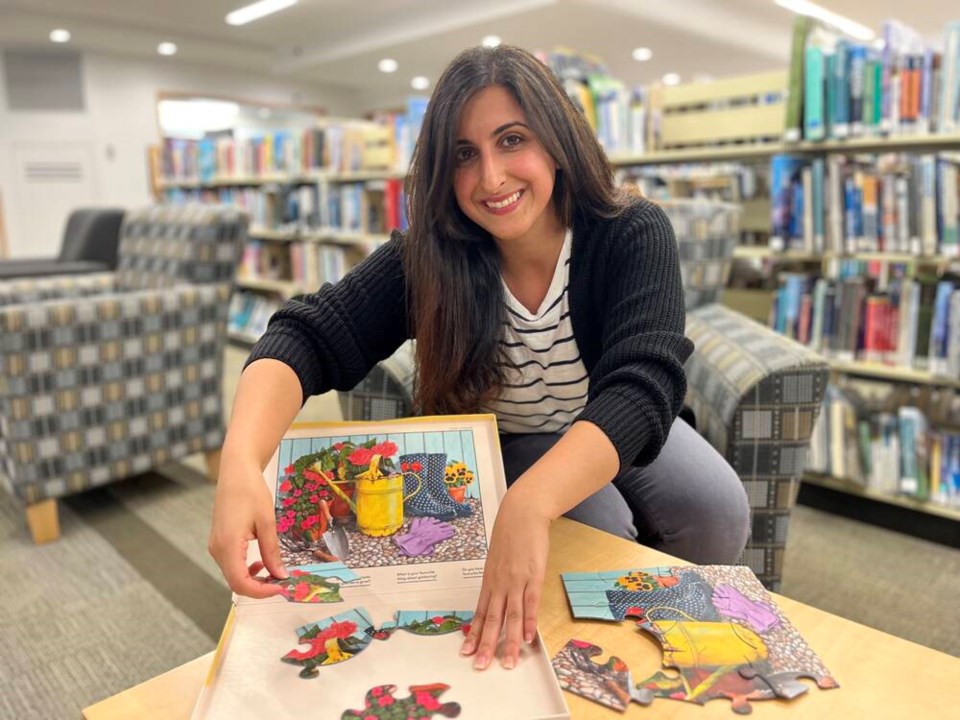We know that physical exercise can help strengthen the body and boost muscle development.
But what about a workout for the mind?
Librarians at the West Vancouver Memorial Library recently turned to that question as they considered the needs of the more than 12,000 seniors in West Van, particularly those facing cognitive challenges including dementia.
The result is a new brain health collection, launched this fall at the library, that can help engage those with cognitive challenges and help strengthen neurological health.
Librarian Ehlam Zaminpaima, who works with accessible services at the library, said she and her colleagues knew there was a need for support for the increasing numbers of seniors living with dementia, as well as their caregivers.
Zaminpaima had seen those needs first-hand with her own grandmother, who had dementia. As her grandmother’s disease progressed, it impacted her quality of life, making it more difficult for her caregivers and immediate family to keep her brain engaged.
With funding from the West Vancouver Library Foundation, Zaminpaima and her colleagues consulted with the Alzheimer’s Society of B.C. on recommended resources.
The result is the library’s new brain health collection, which includes different sets of puzzles and activities designed to strengthen brain health and engagement with family members and caregivers at different stages of neurocognitive disorders.
“Each of those items have been developed with a specific condition or stage in mind. So, some of the products are great for developing hand-eye co-ordination, others are good for mid- to late-stage Alzheimer’s,” she said.
One of the items in the collection is a science-based toolbox developed under the guidance of Cynthia Green, an expert and author on memory fitness and brain health. That might involve an activity around scent and the memories it evokes. Or it might be activities that people can do as a group.
There are also a series of large jigsaw puzzles specifically designed for people with dementia, sets of “aquapaintings” that reveal pictures when “painted” with water, and a board game designed to offer conversation starters and stimulate memories.
Several activities are also more “hands on” and aim at improved eye-hand co-ordination.
There’s even a light therapy lamp, which can be helpful to people who suffer from seasonal affective disorder.
Since it started, the idea behind the collection has also evolved to become broader, said Zaminpaima, to address other kinds of neuro-cognitive challenges like Huntingdon’s and Parkinson’s disease or people who are recovering from a stroke.
“We wanted it to be as low-barrier a collection as possible and we didn’t want to limit it to only a specific group of people,” she said.
In some cases, people might want to just pre-emptively give a workout to that grey matter between the ears.
Nobody will ask why someone wants to borrow an item from the collection.
“If people want to borrow it, they just need a library card,” said Zaminpaima. “People could just pick it off our shelves and take it home with them.”
The other obvious beauty of the collection is it’s free to use.
“All of these items are really costly,” said Zaminpaima, so while some people may have been able to buy one or two of them, “when someone uses the same items over and over again, people get bored with it.”
This way, items can be regularly exchanged and “they’re not just stuck with one or two things at home.”
So far, the collection has been well received. Members of North Shore organizations geared to people with neurocognitive disorders and people from seniors residences were invited to check out the collection when it launched at the end of September.
Since then, the collection has circulated 45 times, according to the library, with plenty of positive commentary.
One library user, whose wife has had Alzheimer’s for 15 years, said he wishes those kinds of resources had been available sooner for her to use.
To see what’s part of the library’s brain health collection, you can look at the items online.



